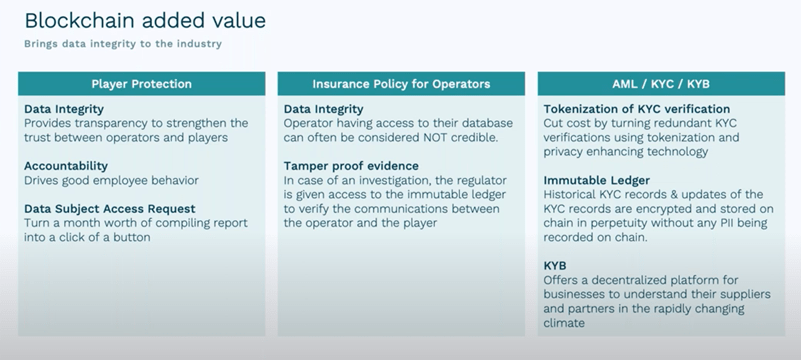Dasiwang: Your Gateway to Trending Insights
Stay updated with the latest news, trends, and insights across various topics.
Decentralized Player Protection: The Future of Fair Play in Gaming
Discover how decentralized player protection is revolutionizing fair play in gaming. Join the future of secure and transparent gaming today!
Exploring Decentralized Player Protection: How Blockchain is Revolutionizing Gaming Safety
The gaming industry has undergone significant transformations over the years, but few innovations have been as promising as blockchain technology. By leveraging its decentralized nature, developers are now able to enhance player protection in ways that were previously unattainable. One of the most significant benefits of blockchain in gaming is the capability to ensure transparency in player transactions. With a secure and immutable ledger, players can verify the authenticity of their transactions, which effectively reduces the chances of fraud. Smart contracts, automated agreements running on the blockchain, also streamline gameplay, ensuring that rewards are distributed fairly and swiftly, thereby enhancing the overall gaming experience.
Moreover, the implementation of decentralized player protection mechanisms fosters a safer environment for gamers. Unlike traditional gaming platforms where central authorities control player data and transactions, blockchain decentralizes this control, allowing players to retain ownership of their in-game assets. This ownership not only empowers players but also mitigates risks such as hacking and data breaches. Furthermore, decentralized platforms often utilize community-driven governance models, enabling players to actively participate in decision-making processes regarding gameplay and platform policies. As a result, the gaming landscape is evolving into a more secure and player-centric ecosystem, revolutionizing how safety is perceived in the gaming world.

Counter-Strike is a popular series of tactical first-person shooter video games in which players assume the roles of counter-terrorists or terrorists. The games emphasize teamwork, strategy, and skill, making it a favorite in the competitive gaming community. For players looking to enhance their gaming experience, using a stake promo code can provide valuable bonuses that improve their gameplay.
Why Decentralization is Key to Fair Play: A Deep Dive into Player Protection
Decentralization plays a crucial role in ensuring fair play within gaming communities by distributing control and authority across various stakeholders rather than concentrating it in a single entity. This shift not only enhances transparency but also fosters a sense of trust among players. When decentralization is implemented, game mechanics and policies can be governed by democratic processes involving players' voices. For instance, voting systems can be established to decide on rule changes or to address grievances. Such mechanisms empower players, ensuring that the game's integrity is upheld while mitigating the risks of abuse or unfair practices.
Furthermore, decentralization significantly enhances player protection by creating immutable records on blockchain technology. This technology offers a transparent and verifiable platform where player transactions and actions are securely logged. Players can be assured that their achievements and investments in the game are protected from manipulation or fraud. Additionally, decentralized systems often provide players with greater control over their assets, enabling them to retain ownership rather than relying on third-party servers which can impose arbitrary restrictions. As such, decentralization not only facilitates fair play but also fortifies player rights and participation in the gaming ecosystem.
Can Decentralized Solutions Safeguard Gamers Against Cheating and Fraud?
The rise of decentralized solutions in gaming is opening up new pathways to protect gamers from cheating and fraud. Traditional systems often fall victim to vulnerabilities that allow for exploitative practices, impacting fair play. By leveraging blockchain technology, game developers can create transparent ecosystems where every action is recorded immutably. This means that cheating can be identified and halted more efficiently, as decentralized platforms provide an auditable history of gameplay activities, ensuring that player integrity is upheld and monitored.
Moreover, decentralized finance (DeFi) mechanisms are being integrated into gaming to create safe environments for transactions. In-game currencies and items can be tokenized and secured on the blockchain, drastically reducing the risk of fraud. For instance, a decentralized marketplace can facilitate trustworthy trades between players, eliminating the need for middlemen who may not have players' best interests at heart. By adopting these decentralized solutions, we enable a fairer gaming landscape, where gamers can focus on their skills rather than the fear of being cheated.